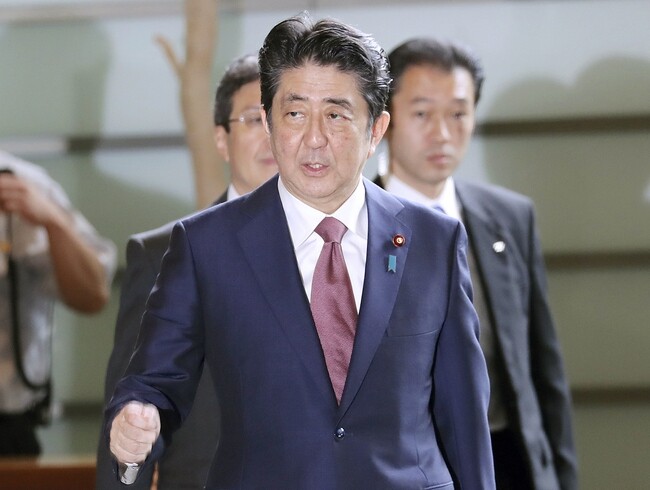hankyoreh
Links to other country sites 다른 나라 사이트 링크
Abe voices “dismay” over controversy surrounding Rising Sun Flag at intl. naval review

Japanese Prime Minister Shinzo Abe voiced his “dismay” over the recent controversy regarding the planned raising of the Rising Sun Flag at the International Fleet Review in Jeju and a visit to the Dokdo islets by members of the South Korean National Assembly. The message was Abe’s first statement of a position on the matters.
“Although we have had several opportunities to confirm that we are seeking to cooperate toward establishing a future-oriented Japan-South Korean relationship based on this year marking the 20th anniversary of the Japan-South Korea Joint Declaration [A New Japan-Korean Partnership towards the Twenty-First Century], it is dismaying that we have had the issue with the raising of our naval ensign at the Fleet Review, the Takeshima (Dokdo) visit by South Korean National Assembly members, and various other things that have run counter to this [future-oriented South Korea-Japan relationship],” Abe said at an Oct. 29 regular session of the Japanese House of Representatives.
Abe’s remarks came in response to a question from Liberal Democratic Party (LDP) senior deputy secretary-general and special advisor Tomomi Inada. Famously leaning even harder right than Abe, Inada posed her questions with phrasing that appeared to denounce the South Korean government’s request for Japan to refrain from raising the Rising Sun Flag at the Jeju review and the Dokdo visit by South Korean National Assembly members.
In one question, Inada noted, “The South Korean Supreme Court is issuing a ruling on the issue of conscripted workers [a term used in Japan to refer to victims of labor conscription], and there are strong concerns that the content will be in opposition to the treaty establishing basic relations between South Korea and Japan.”
“This is contrary to the definition by international law,” she protested.
While he did not directly address the issue of forced labor ruling in his response, Abe’s use of the term “dismaying” in his response to Inada’s questions could be seen as also directed at the ruling, which did not favor Japan.
Abe went on to say that Tokyo would “continue responding appropriately to the unfortunate issues between Japan and South Korea and work toward building a future-oriented Japan-South Korean relationship.”
“I very much look forward to an appropriate response from the South Korean government,” he added.
By Cho Ki-weon, Tokyo correspondent
Please direct comments or questions to [english@hani.co.kr]
Caption: Japanese Prime Minister Shinzo Abe

Editorial・opinion
![[Editorial] Intensifying US-China rivalry means Seoul must address uncertainty with Beijing sooner than later [Editorial] Intensifying US-China rivalry means Seoul must address uncertainty with Beijing sooner than later](https://flexible.img.hani.co.kr/flexible/normal/500/300/imgdb/original/2024/0517/8117159322045222.jpg) [Editorial] Intensifying US-China rivalry means Seoul must address uncertainty with Beijing sooner than later
[Editorial] Intensifying US-China rivalry means Seoul must address uncertainty with Beijing sooner than later![[Column] When ‘fairness’ means hate and violence [Column] When ‘fairness’ means hate and violence](https://flexible.img.hani.co.kr/flexible/normal/500/300/imgdb/original/2024/0516/7417158465908824.jpg) [Column] When ‘fairness’ means hate and violence
[Column] When ‘fairness’ means hate and violence- [Editorial] Yoon must stop abusing authority to shield himself from investigation
- [Column] US troop withdrawal from Korea could be the Acheson Line all over
- [Column] How to win back readers who’ve turned to YouTube for news
- [Column] Welcome to the president’s pity party
- [Editorial] Korea must respond firmly to Japan’s attempt to usurp Line
- [Editorial] Transfers of prosecutors investigating Korea’s first lady send chilling message
- [Column] Will Seoul’s ties with Moscow really recover on their own?
- [Column] Samsung’s ‘lost decade’ and Lee Jae-yong’s mismatched chopsticks
Most viewed articles
- 1Celine Song says she’s gratified global audiences have responded to the kismet of ‘inyeon’
- 2[Editorial] Transfers of prosecutors investigating Korea’s first lady send chilling message
- 3[Exclusive] Unearthed memo suggests Gwangju Uprising missing may have been cremated
- 4For new generation of Chinese artists, discontent is disobedience
- 5[Column] US troop withdrawal from Korea could be the Acheson Line all over
- 6Xi, Putin ‘oppose acts of military intimidation’ against N. Korea by US in joint statement
- 7Highly educated high-earners at risk of being replaced by AI, BOK study says
- 8Japan begins dumping irradiated Fukushima water amid outpouring of concern about vague timeline
- 9USFK sprayed defoliant from 1955 to 1995, new testimony suggests
- 10Four unionists arrested for protesting Fukushima dumping atop King Sejong statue